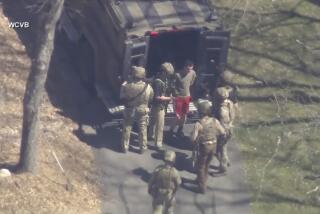Baker Knew of Terrorist, Iraq Ties, Records Show : Gulf War: He is said to have known Abul Abbas was being sheltered when pro-Baghdad policy was created.
- Share via
WASHINGTON — Former Secretary of State James A. Baker III and other senior officials knew Iraq was sheltering Abul Abbas, the mastermind of the Achille Lauro hijacking, when the Bush Administration began formulating its pro-Iraqi policy in 1989, according to declassified documents made public Monday.
Baker, now President Bush’s chief of staff, was informed in March, 1989, that Iraq still provided a base of operations for Abbas’ organization and another Palestinian terrorist group linked to the killings of Americans, according to State Department documents. A disabled American was slain during the Achille Lauro hijacking.
The papers, prepared by Iraq and Mideast experts in the State Department, also show that Iraq’s oil reserves were a consideration as the two-month-old Administration fashioned its policy toward Baghdad. According to a 1989 memo, Iraq began providing “favorable deals to U.S. oil companies” and increasing exports to the United States in 1988 to influence U.S. policy.
It has been reported previously in The Times and elsewhere that the U.S. government removed Iraq from the list of countries supporting terrorism in 1982 over the objections of officials who maintained Iraq continued to support terrorists. The removal allowed Iraq to begin receiving various forms of U.S. aid.
The new documents, which were released by Rep. Henry B. Gonzalez (D-Tex.), contain the first specific references to how Iraq was aiding major terrorists and show for the first time that warnings were transmitted to officials as high as Baker. Yet the Bush Administration did not restore Iraq to the terrorist list until after the Iraqis invaded Kuwait in August of 1990.
A State Department official said oil policy was not a big consideration in formulating policy toward Iraq and that Baghdad was credited for making progress in dealing with terrorists.
“We believe that Iraq did reduce its support for terrorism,” the official said Monday. “Abu Nidal was expelled and other terrorist groups were reined in. Iraq’s record was not entirely clean, but there was improvement.”
The documents--a declassified briefing memo and accompanying “talking points” prepared by Iraq and Mideast experts in the State Department--were sent to Baker on March 23, 1989, the day he met with high-ranking Iraqi officials. The memo said the meeting was to express the new Administration’s interest in broadening ties with Baghdad.
The documents described some U.S. concerns impeding those ties, such as Iraq’s use of chemical weapons and its failure to fulfill its promise to pay damage claims related to its shooting of the U.S. Navy ship Stark in 1987, which killed 37 U.S. sailors.
Iraq also was credited with expelling terrorist leader Nidal, but the documents raised concerns over Baghdad’s continuing ties to Abbas and to another Palestinian terrorist known by the nom de guerre Col. Hawari.
“We are disturbed by the continued presence in Iraq of Abu (sic) Abbas, who masterminded the murder of a U.S. citizen in cold blood,” said the talking points, which served as a script for Baker in the session. “We also understand that Col. Hawari--head of Fatah’s Special Operations Group--still travels to Baghdad.”
The documents proposed that Baker ask Nizar Hamdoon, the former U.S. ambassador then serving as Iraq’s under secretary for foreign affairs, to deny Abbas and Hawari access to Iraq as part of the price for better U.S. relations and the increased access to U.S. technology sought by Iraq.
Abul Abbas had been blamed for the October, 1985, hijacking of the Achille Lauro passenger liner. Leon Klinghoffer, an elderly American passenger on the ship, was dragged from his wheelchair, shot and thrown overboard during the incident.
A report prepared by the State Department in October, 1988--only five months before Baker’s meeting with the Iraqis--linked Hawari’s organization to numerous bombings, including the April, 1986, destruction of a TWA aircraft outside Athens that killed four Americans.
Intelligence officials have said in interviews that both terrorist organizations continued to use Iraq as a base of operations long after the request from Baker that they be expelled.
In May, 1990, according to sources, Abbas was operating out of Iraq when he launched a guerrilla attack on the Israeli coast near Tel Aviv that led the Administration to break off talks with the PLO. Hawari moved in and out of Iraq until he was killed in a car accident in May, 1991--on the road between Amman, Jordan, and Baghdad.
The newly declassified documents also raise questions for the first time about the impact of Iraq’s oil policies on U.S. strategy toward the regime of Iraqi President Saddam Hussein.
In the March 23, 1989, State Department memo, Baker was told: “As part of its approach to the United States, Iraq has in the last year given favorable deals to U.S. oil companies; oil exports to the United States have soared to around 500,000 barrels per day.”
Bush and other senior officials have maintained that billions in U.S. loan guarantees and sales of technology to Iraq were intended to moderate Hussein’s behavior on the international scene. However, Gonzalez said the memo illustrates another view.
“Our main goal was access to cheap oil,” Gonzalez, chairman of the House Banking Committee, charged in a speech on the House floor Monday. “Hussein wanted cash, credit and military technology. Oil made it all possible.”
Gonzalez also said the top-secret order signed by Bush in October, 1989, mandating closer ties to Baghdad, stressed that access to Persian Gulf oil was vital to U.S. interests in the region.
U.S. imports of Iraqi crude rose sharply in the first years of the Bush Administration, until the presidential embargo following Iraq’s invasion of Kuwait. A declassified CIA analysis said U.S. purchases of Iraqi crude rose from 80,000 barrels a day to 675,000 barrels a day by April, 1990. By the time of the invasion, U.S. companies were importing 1.1 million barrels of Iraqi crude daily, according to other figures.
Pricing data compiled by Petroleum Intelligence Weekly, an industry trade paper, shows that U.S. importers paid an average of about $1 less per barrel for Iraqi crude than European importers in late 1988 and 1989.
However, many factors affect oil prices and the United States is the world’s largest and most competitive oil market. It remains in dispute whether the Iraqis were trying to win favor with the Bush Administration or increase their share of the American market by increasing exports to this country and reducing the price.
“Iraq was doing what it was doing out of its own commercial interest, not out of any desire to build relations with the American government,” said James A. Placke, an oil expert with Cambridge Energy Research Associates.
More to Read
Sign up for Essential California
The most important California stories and recommendations in your inbox every morning.
You may occasionally receive promotional content from the Los Angeles Times.













